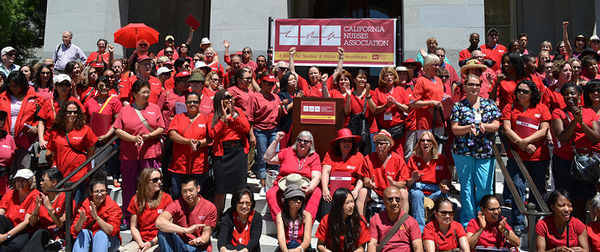Press Release
Will California Finally Demand Non-Profit Hospitals Meet Their Obligation on Providing Charity Care?

California state senators will get their first look Wednesday at this year’s version of legislation that would finally require non-profit hospital giants to live up to their obligation on provision of charity care and community benefit programs in return for the windfall in taxpayer funded revenues they receive in return for their tax exempt status.
SB 346, the Community Benefit and Charity Care at Nonprofit Hospitals Act, introduced by State Senator Bob Wieckowski of Fremont, will be reviewed by the Senate Health Committee Wednesday in a hearing that begins at 1:30 p.m. in Room 4203 of the State Capitol.
Key goals of the bill are to assure that non-profit hospitals provide uniform levels of charity care and community benefit programs, increase reporting to provide greater public transparency, and require increased community representation on the hospital giants’ community benefits planning boards. The California Nurses Association/National Nurses United, the Greenlining Institute, and the California Rural Legal Assistance Foundation are among the bill’s lead sponsors.
Hospitals Collect Billions in Tax-Exempt Subsidy Beyond Charity Care Provision
A 2012 CNA research study documented that California non-profit hospitals collect $1.8 billion in tax benefits beyond what they provide in charity care. Among major chains, St. Joseph Health System, Providence Health System, Adventist Health, and Scripps Health all provided less than half of their net income (profits) in charity care. Kaiser Permanente, Sutter Health, Memorial Care, and Cottage Health all provided less than a quarter of their profits in charity care.
Two reports by the California State Auditor’s Office in recent years have also cited the lack of uniformity in reporting and recommended the legislator address the disparity.
But the California Hospital Association, which is the fourth biggest spender in lobbying in Sacramento, has vehemently opposed prior legislative efforts to rein in what CNA views as a widespread abuse by non-profit hospital giants. And, with the defeat of prior bills, some hospitals are even cutting back what they spend on charity care and community benefit services.
Hospital Giant Sutter Cuts Spending on Charity Care, Community Benefit Services
Sutter, for example, in March reported that it spent only $91 million in charity care, down from $166 million in 2013. Sutter’s spending on community benefits also sharply declined from $901 million in 2013 to only $767 million last year – and Sutter is currently pushing to close an Oakland residential rehab facility for teenagers who are in need of substance abuse or mental health services, an operation it presumably counts as part of its community benefit contribution. Over the past five years, Sutter has recorded $3.5 billion in profits.
St. Joseph Lags Behind Other Catholic Hospital Systems
St. Joseph also provides examples of what CNA believes are indications of the need for greater transparency and corporate accountability by non-profit hospital giants. Among big Catholic hospital systems in California, St. Joseph ranks last in provision of charity care as a percentage of operating expenses, according to the Office of Statewide Health Planning and Development.
“The time has come to assure these corporate giants behave as responsible companies, not just like Wall Street firms that provide little in return to our communities for the generous tax support they receive,” said CNA Co-President Zenei Cortez, RN.
Cuts in charity care and community benefit spending by the big hospitals, along with a wide gap between what they receive in tax subsidies beyond what they return in charity care, come as “far too many Californians continue to struggle with access to needed care or un-payable medical bills, even with the implementation of the Affordable Care Act,” said Cortez.
“Californians deserve to know whether these hospitals are meeting their obligation to provide appropriate levels of charity care and community benefit services. That’s what SB 346 will accomplish,” Cortez added.
New Signs in California of Intent to Crack Down on Charity Care Abuse
Signs also continue that California is ready for stronger accountability for non-profit hospital systems. California just pulled the tax-exempt status of a major insurance company Blue Shield, and Attorney General Kamala Harris demanded proper levels of charity care and community benefit as a condition for approval of the sale of a large hospital chain.
What SB 346 Does
- Clearly define what constitutes charity care which must be the direct provision of care to the uninsured or underinsured. It cannot include writing off uncollected fees as “bad debt” or contractual agreements with insurers or other payers that are below the hospital’s inflated gross chargemaster rates.
- Ensure that “community benefit” spending meets real community needs by addressing the root causes of poor health, such as poor nutrition and unsafe housing as well investing in community building activities in medically underserved or low income communities.
- Improve reporting requirements for greater public transparency to ensure hospitals are meeting their charity care and community benefit obligation rather than just increasing revenues through marketing, cost containment, or other activities more intended to generate profit.
- Require community representation, from underserved and vulnerable populations and a public health department, on each hospital or system’s community benefits planning committee.
Under recent amendments to the bill, hospitals would be permitted to count some supposed shortfalls in reimbursement for some Medi-Cal, California Children’s Services Programs and Medicare. They could also count repayment of pre-employment student debt for hospital employees as a community benefit.
Children’s hospitals, county hospitals, other public facilities, and small rural hospitals are exempted under SB 346.